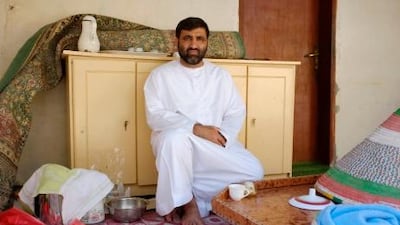RAS AL KHAIMAH // Shaikha Al Dabdoob was furious with Saeed Abdulla, the goatherd.
After an altercation with the father over a previous birth, she vowed to never deliver another child for the family.
But when the mother fell pregnant again, she couldn't turn a blind eye, so she trained her daughter to be a midwife. That way, she could help without breaking her word.
Abdulla Al Hebsy was born after the call to fajr prayer one morning in October 1971 after a four-hour labour.
His passport reads 01/01/1970 but all know that he was born in Oct 1971 because it was the night of a large wedding, recorded by many.
Abdulla grew from a healthy child into a man with soft brown eyes and a meticulously trimmed black beard with a few white hairs that hint of middle age.
He has taught his children to measure wealth by family, not luxury.
"I hope my children grow up better than me and learn more," said Abdulla. "They have full freedom to learn anything they want but I hope that they will learn my traditions."
Abdulla was born in a palm house in a neighbourhood where flamboyant mansions stand today. He was the last of his 11 siblings to be born outside of the hospital.
His father spent the 1960s working in construction in Saudi Arabia and as sailor in Bahrain. His mother married at age 13 and bore children for 30 years.
Abdulla spent the first five years of his life moving between a palm summer house on the floodplains of Wadi Al Baih and a stone winter home in the mountains of Wadi Hajila.
One of the first changes to come from the union was the weekly delivery of water so that they did not rely on cisterns that collected rainwater or water from springs near the plains that was carried home in goatskins.
"We were poor so we carried the water ourselves," said Abdulla. "Some other people had donkeys or even camels."
His family moved to a two-bedroom concrete house with electricity in the mid-70s. They slept in one room. A spare bedroom and majlis were for guests.
Upon completing Grade 12, Abdulla enrolled with the police, where he has served for 21 years.
Fatherhood is his first responsibility. He loves children so much that he married twice, to a relative when he was 23 and to an Omani when he was 30.
Abdulla is the only one in his family to have two wives. They are both now 35 years old and live in separate houses. Together, they have eight children, ages two to 16.
"If he sees a child he goes directly to them and hugs him," says his sister Khadija, 21, a student at the RAK Women's College.
Abdulla is forgiving, compassionate and loyal but is best loved because he brings music into the home.
"When he is coming to our house he also does the drum, singing and dancing with my father."
When he wants peace, he goes to the mountains.
"There's no noise; it's natural" said Abdulla. "In the mountains the only people are my relatives and there are no problems."
Abdulla's father, now about 80, has continued the annual migration between mountain and plains that follows the rains. He went to his mountain house last week and will stay there until April.
They keep about 70 goats and are not keen on development.
"Streets, telephones and cars are no problem but it is enough," said Abdulla. "I don't want any other development there."
Abdulla still visits the woman who delivered him, whom he calls 'mother'.
azacharias@thenational.ae

